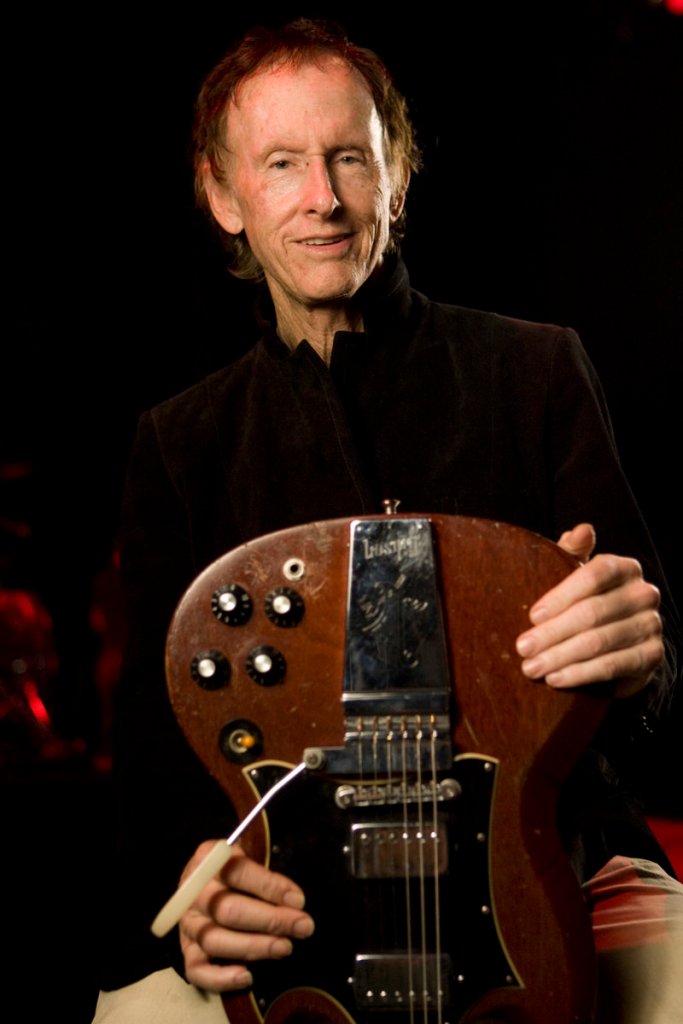Robby Krieger’s Jazz Kitchen — as if the name isn’t clue enough for you — is definitely not a Doors tribute band.
Certainly, Krieger owes a great deal of his fame to the fact that he played guitar behind Jim Morrison’s exploding vocals on rock classics such as “Light My Fire,” “Love Me Two Times” and “L.A. Woman.”
But that was a long time ago. More than 40 years have passed since Morrison’s untimely death in Paris at age 27.
So Krieger treats his Doors days like anyone might treat the distant past. He talks about it with respect and dabbles in it a little, touring with Doors keyboardist Ray Manzarek and playing the occasional Doors tune at his own shows.
But he doesn’t live in it.
And he’s been behaving this way long enough that most people know, Krieger says, what to expect at his solo shows.
“Mostly, people know not to ask for any Doors songs, though we might throw in a couple instrumental versions once in a while,” said Krieger, 66, speaking from a hotel in Montreal on Tuesday. “We do ‘You’re Lost Little Girl’ (from 1967’s “Strange Days”) sometimes. We’ve got a nice little version of that one.”
Krieger has, over the years, recorded vocal versions of Doors tunes, even though he admits many Doors songs don’t “lend themselves” to voices other than Morrison’s very well.
“I did a reggae version of ‘The Crystal Ship’ (from The Doors’ 1967 debut), and that worked out pretty well,” he said.
The setlist will be mostly instrumental and mostly not from The Doors catalogue when Robby Krieger’s Jazz Kitchen performs Saturday at Port City Music Hall in Portland.
The band’s name is as much about the kitchen as it is the jazz, Krieger says.
“It’s not straight-ahead jazz, but it’s very interesting music, and we throw in just about everything, including the kitchen sink,” he said.
In addition to Krieger, Jazz Kitchen includes veteran musicians Arthur Barrow on bass and keyboard player Tommy Mars, who both played with Frank Zappa’s band; drummer Tom Brechtlein, who played with Chick Corea; and horn player Larry Klimas, who has played with everyone from War and Neil Diamond to Chicago and Billy Ocean.
Krieger himself is certainly not new to performing in a jazz format. Besides the fact that he lent a jazzy guitar feel to many Doors classics, he’s released several jazz albums as a solo artist since the ’70s.
When he’s not touring or recording, Krieger is an avid golfer who is involved in lots of tournaments and charity events. His latest project is his own music and film studio in California, which will offer analog recording.
Krieger says he’s seen around Los Angeles that younger musicians are moving away from digital recording and trying out old-fashioned analog using tape.
“It’s already happening — people turning back to analog because of the sound, because of the process,” he said. “This might be the wrong time to get into the studio business, since anyone can build a studio at home, but I think there’s going to be people wanting this kind of place. I think people will get tired of working at home.”
Along with The Beatles, The Rolling Stones, The Jimi Hendrix Experience and a few others, The Doors is one of the few bands of the ’60s that continue to appeal to new generations. The band’s groundbreaking sound, which combined psychedelic rock with bits of flamenco, jazz and blues, melded perfectly with Morrison’s poetic lyrics and “lizard king” persona.
Looking back at it now, Krieger thinks he and a lot of other musicians of that era were mostly “in the right place, at the right time.”
“When rock started, with Fats Domino and Elvis, it was amazing, like nothing anyone had ever heard,” said Krieger. “But music goes in cycles, so there was some pretty lame stuff in the early 1960s.
“Then along came a lot of folks who wanted to do something different, something cool.”
Staff Writer Ray Routhier can be contacted at 791-6454 or at:
rrouthier@pressherald.com
Send questions/comments to the editors.



